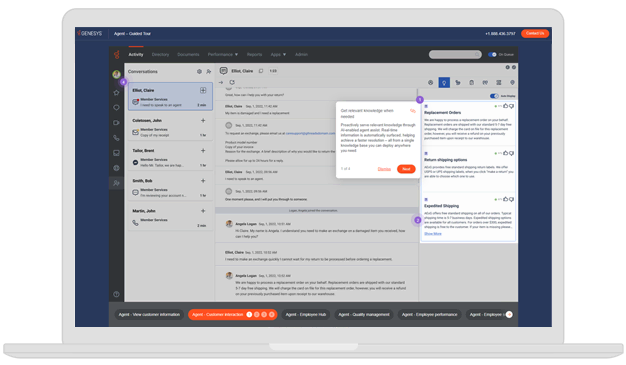GENESYS MASTER SUBSCRIPTION AGREEMENT
SUPPLEMENTAL TERMS: OUTBOUND COMMUNICATION SERVICES
***CONFIDENTIAL***
THESE SUPPLEMENTAL TERMS ARE ENTERED INTO BETWEEN THE PARTIES TO THE LINKING SERVICES ORDER, SUBJECT TO THE TERMS AND CONDITIONS OF THE GENESYS MASTER SUBSCRIPTION AGREEMENT AND THE APPLICABLE ATTACHMENTS THERETO. THE PARTIES FURTHER AGREE THAT EXECUTION OF THESE SUPPLEMENTAL TERMS MAY OCCUR BY ANY MEANS OF SIGNATURE, INCLUDING VIA ELECTRONIC COMMERCE OR TRANSMISSION, FACSIMILE, EMAIL, OR ACKNOWLEDGEMENT THROUGH A WEBPAGE. THESE SUPPLEMENTAL TERMS ARE SUPPLEMENTAL TO, AND ARE NOT IN LIEU OF, ANY TERMS OF THE AGREEMENT. THESE TERMS ARE APPLICABLE TO ALL OUTBOUND COMMUNICATION OR ENGAGEMENT SERVICES.
In consideration of the mutual promises and obligations in these Supplemental Terms, the sufficiency of which is hereby acknowledged, the parties agree as follows:
1. General Terms and Conditions
1.1. Customer is responsible for determining whether the outbound communication service capabilities of the Genesys Cloud Services are suitable for Customer’s specific needs. Customer determines the manner and means of transmitting outbound communications for purposes including marketing, customer care, and collections using the Genesys Cloud Services, including live agent calling, automated voice messages, IVR, email, text, MMS, web, and push notifications.
1.2. Customer is responsible for the Content transmitted, collected or processed in connection with Campaigns. Customer will develop Campaigns using Genesys tools subject to Customer’s management and oversight. If Customer retains Genesys to create and execute Campaigns on Customer’s behalf, Genesys will develop draft campaign communication. Customer will supervise Genesys’ work, review and revise draft as appropriate for Customer’s needs, and take responsibility for the final message copy.
1.3. Customer is responsible for obtaining, documenting and managing all required consents from all Recipients and permits associated with use of the services in accordance with applicable Law. Customer is responsible for all Recipient Numbers that are used in connection with Customer’s use of the Genesys Cloud Services. Customer is also responsible for complying with all restrictions imposed on the means and manner of transmitting communications to Recipients. Without limiting the foregoing, Customer is responsible for: (i) originating (or causing the origination, via Recipient opt-in requests, of) its desired Messages for Initiation by the Genesys Cloud Services; and (ii) ensuring that Recipient Numbers are the correct Recipient Numbers for the intended Recipient. Recipient Numbers do not include: (i) emergency lines, including those of any hospital, medical center, health care facility, poison control center, fire protection agency, or law enforcement agency, (ii) any number assigned to a paging service, cellular telephone service, or other wireless service, unless appropriate consents to transmit to such numbers have been obtained from the intended Recipient, and (iii) for calls routed using automated dialing, any number to which automated dialing or prerecorded message calls are prohibited under applicable Laws.
1.4. Customer shall: (i) establish and provide the time(s), date(s), and delivery schedule(s) for Messages, (ii) ensuring that (A) no Campaign transmits Telemarketing Messages before 8 a.m. or after 9 p.m. local time at the Recipient’s location, and (B) no Messages, including Telemarketing Messages, are transmitted outside of hours allowable under applicable Laws.
1.5. Genesys will use commercially reasonable efforts to transmit Customer’s Messages as directed by Customer. Customer acknowledges that the Genesys Cloud Services are limited to the transmission of Messages and that, to reach an intended Recipient, such Message will be relayed via and retransmitted by one or more Providers. All Provider interactions are provided “AS IS” and without warranty of any kind. Genesys does not guarantee that Messages, once transmitted by the Genesys Cloud Services, will be received, delivered, or opened by Recipients. Customer acknowledges and consents to Genesys’ provision of Messages and other data to Providers and understands that Providers may reformat the Message to conform and adapt to Provider requirements and device requirements.
1.6. Genesys Cloud Services are designed to facilitate compliance with certain domestic and international regulatory obligations and applicable Laws related to outbound dialing and other means of outbound communication through the use of features such as checking Recipient Numbers against Do-Not-Call lists, List Profile Report, and Phone Ownership Verification (each such feature, if enabled by Customer for the applicable Message, a “Compliance Instruction”). Compliance-related features are provided “AS IS,” without representation or warranty of any kind regarding the accuracy of such data or, without limitation, are sufficient to meet the obligations imposed by applicable Laws, including but not limited to the TCPA, CAN-SPAM, and FDCPA in the US, the EC Directive in the UK, and similar legislation, rules and protocols in other jurisdictions. Notwithstanding the foregoing features of the Genesys Cloud Services, Customer is responsible for determining the Laws applicable to Customer’s use of the Genesys Cloud Services and for determining whether its use of the Genesys Cloud Services remains compliant with such Laws. Customer is also responsible for determining and implementing the applicable Compliance Instruction in accordance with applicable Laws.
1.7. With respect to Compliance Instructions related to a Recipient’s request to opt-out of receiving text Messages, Genesys will confirm an opt-out with one subsequent automatically-enabled Message only if a Recipient sends an explicit and unambiguous opt-out request directly to the Genesys Cloud Services via the same Recipient Number, and only in the event such request is transmitted by such Recipient’s mobile handset. Unless requested by Customer, Genesys will not send an opt-out confirmation in respect of any other Recipient opt-out request (e.g. an ambiguous text message, or an opt-out request initiated online, by email, by chat, by voice call, or letter addressed to a street address). Customer accepts sole responsibility for determining whether confirmation of an opt-out request is required by Law and for instructing Genesys to send out such Messages if so required. Customer is also solely responsible for determining whether the Genesys-enabled opt-out mechanism is sufficient for Customer’s needs or whether such mechanism is sufficient to comply with applicable Law.
2. Text Messaging – Additional Terms
2.1. Short Codes or Text-Enabled Toll-Free Numbers are used for Customer Messages transmitted within the U.S. and Canada. Customer may provide Short Codes or Toll-Free Numbers for use with the Genesys Cloud Services or may request Genesys to lease Short Codes or Toll-Free Numbers on Customer’s behalf. Leasing and provisioning a Short Code takes at least 45 days while Text-Enabled Toll-Free Numbers takes approximately 14 days, and is dependent on receipt of information from Customer and coordination with Providers. Delays may occur in the provisioning process if Customer does not respond quickly to requests for information and for payment. The provisioning timeframe is also dependent upon the responsiveness of the Carriers, and Genesys is not liable for delays from specific Carriers due to Carriers unresponsiveness. Customer takes responsibility for all information Customer provides in connection with leasing Short Codes or Text-Enabled Toll-Free Numbers. Customer acknowledges that its use of a Short Code or Text-Enabled Toll-Free Number is limited to the duration and purpose as set forth in the Short Code or Text-Enabled Toll-Free Number lease application. Customer will provide complete and accurate information in connection with leasing of Short Codes or Text-Enabled Toll-Free Numbers.
2.2. Long Codes, Short Codes, or Alpha Sender IDs may be used for Customer Messages transmitted outside of the U.S. and Canada.
2.3. Customer may lease a Random Short Code or Vanity Short Code, either of which may be a Shared Short Code or Dedicated Short Code. Customer expressly acknowledges that Shared Short Codes may be leased to many other companies and thus are subject to a higher risk of misrouted communications (e.g., the Common Short Code Administration may lease a short code such as “24242” to multiple companies). Customer’s use of Shared Short Codes is at Customer’s sole risk. Genesys reserves the right to determine whether to support Shared Short Codes.
2.4. Customer understands that Providers impose policies on the use of wireless data services, wireless carrier equipment, and application provisioning services to transmit Messages. Customer shall adhere to the latest version of the Guidelines published by the CTIA, including the CTIA Short Code Monitoring Handbook. If Customer or Customer’s Subscribers violate any such Handbook, then Genesys and/or the Providers reserve the right to immediately cutoff all (or associated) Message activity.
3. Sensitive Information.
Customer shall ensure that any Sensitive Information transmitted or stored through use of the Genesys Cloud Services shall be done only in circumstances where the Sensitive Information is captured within an encrypted field. To the extent reasonably within Customer’s control, Customer shall exclude Sensitive Information from reporting and analytics features. Customer acknowledges that speech recognition and audio recording of Sensitive Numbers and PII (e.g. credit card, social security numbers) is supported only if the content is in an encrypted format and thus may not be available in all circumstances. To capture numerical Sensitive Information, Customer shall ensure that all callers enter such Sensitive Information via the Genesys Cloud Services only by pressing phone keys (i.e., dual-tone multi-frequency signaling or DTMF).
4. Subscription, Fees, Expenses, and Pricing Notes
4.1. Fees set forth in Services Orders are subject to Customer’s fulfillment of the Initial Subscription Term. Except as otherwise provided in an applicable Services Order, Customer is obligated to meet a minimum purchase commitment equal to the total monthly recurring fees times the number of months that comprise the Initial Subscription Term. If Customer is subject to meeting a minimum purchase commitment, pricing for the applicable Genesys Cloud Services will remain fixed for the duration of the Initial Subscription Term. Except as otherwise stated in a Services Order, usage of more than ten percent (10%) above a minimum purchase commitment is subject to a surcharge of fifteen percent (15%) applied to all then-current Fees. If Customer is not subject to a minimum purchase commitment, pricing is subject to change upon 30 days written notice from Genesys. Fees exclude, and Customer is responsible for, all sales, use and other taxes.
4.2. As reasonably requested by Genesys, Customer will provide Genesys with forecasts of Customer’s anticipated future usage of the Genesys Cloud Services. Customer’s forecast is for informational purposes to assist Genesys with capacity planning and service management; forecasts do not alter the terms of the Subscription.
4.3. Customer may cancel services at any time on 60 days’ prior written notice, provided Customer pays for all services utilized through the date of cancellation. Customers that have made a minimum purchase commitment, whether based on volume or spend, will be responsible for meeting their commitment, regardless of termination.
4.4. Fees will be determined in accordance with the fee schedule provided and invoiced on a calendar month basis. At the beginning of each calendar month, Customer’s monthly volume will be restarted; minutes or messages (if applicable) will not roll over.
4.5. Data uploaded and stored by the Genesys Service greater than 14 days with no calling activity will be deleted from the Genesys system automatically. For disaster recovery/business continuity applications, pricing for data recovery is available upon written request. Genesys will make production data available for 15 months on-line.
4.6. Professional Services are billed separately in accordance with the client management fee structure or such other rates as set forth in a mutually acceptable Statement of Work.
4.7. A private network requires Customer to provide network connection into Genesys data center location. Customer provides network switch and firewall.
4.8. Voice Messaging Pricing Notes
- 4.8.1. Call Minute charges begin when the Call is picked up by any person or device and ends when the call is terminated. All calls will be assessed a charge except calls that result in a busy signal or no answer. Call Minutes are country specific and apply to outbound calls from any Genesys Data center. The Genesys Cloud Outbound Pricing Guide is available upon request.
- 4.8.2. All call minutes are billed in 6-second increments, rounded up to the nearest increment, subject to the following: (i) Minute charges begin when the person or device picks up the call and end when the call is terminated; (ii) where Customer elects to have calls hang-up on answering machines, each such call will be charged for 12 seconds; if Customer initiates a call that results in a bad number automated response, each such call will be charged for 12 seconds.
- 4.8.3. An outbound call is defined as a call initiated on the Genesys system by or for the Customer.
- 4.8.4. An Inbound call is defined as a call initiated by a customer of the Customer using a phone number provided by Genesys.
- 4.8.5. Billing for LocalTouch number buckets starts upon assignment of that number bucket. LocalTouch is an optional service that is designed to deliver local caller identification. There is no proration for LocalTouch number buckets.
- 4.8.6. Genesys’ agent portal is required for predictive dialer calls unless a CTI connection is established. Agents will be connected to the Genesys Cloud Services for the duration of their session.
- 4.8.7. Agent idle and after call work times will be billed to the extent agents remain are connected to the Genesys Cloud Services unless a Private Network or Toll-Free connection is in place.
- 4.8.8. Maximum Concurrent Usage Seat invoicing is based on max concurrent logins per billing period. Genesys can set a maximum limit if Customer desires. Seats exceeding limit may be denied unless Customer contacts Genesys to increase limit.
- 4.8.9. Fixed Price Seat invoicing is based upon a fixed number of seats and shall be invoiced to and paid by Customer every billing period irrespective of actual use. The number of seats can be increased or decreased by Customer during the month, but decreases in seats during the month are not subject to proration.
4.9. Text Messaging Pricing Notes
- 4.9.1. Text Message pricing is per Message sent by the Genesys Cloud Services in addition to the applicable monthly charges for the transmitting number set forth in Section 4.9.3. In the event that Messages are sent that are longer than what can fit into one text message body (typically 160 characters), the Message may be divided into multiple Messages and delivered separately. In this case, each Text Message in the series shall be considered a separate and distinct Message and shall be charged accordingly. For example, if a Message contains 180 characters, then there would be two (2) Messages.
- 4.9.2. Customer is billed for Opt-In/Opt-Out response messages received in responses to Campaigns. These responses may be received weeks or months after the Campaign has ended.
- 4.9.3. Customer must secure and use a transmitting number issued by Providers. Short Code, Long Code, Alpha Sender ID, and Text-Enabled Toll-Free Number fees are monthly and commence on the date Genesys orders the number on Customer’s behalf. Customer will be billed for all Short Codes, Long Codes, Alpha Sender IDs, or Text-Enabled Toll-Free Numbers obtained by Genesys on a monthly basis. Except as otherwise established with a Provider, a 90-day advance written notice is required to cancel a Short Code.
- 4.9.4. For Short Codes, Long Codes, Alpha Sender IDs, and Text-Enabled Toll-Free Numbers that are still active, Customer will be billed for all inbound Text Messages received, as well any responses to these inbound Text Messages.
4.10. Email Pricing Notes
- 4.10.1. Email pricing is per Message sent by the Genesys Cloud Services.
- 4.10.2. Genesys reserves the right to apply a surcharge of 25% of all Message Fees for Messages greater than 100 kilobytes in size.
- 4.10.3. The annual fee for the Dedicated IP and Mailing Domain Name service is due when the Genesys Service is activated and on each subsequent activation anniversary.
5. Support and Service Levels
5.1. Customer will submit requests for Support subject to the processes set forth in the Support User Guide. Prior to reporting an issue, Customer shall investigate the issue and make reasonable use of the self-help guides and information posted on the Customer Care Portal. Customer personnel submitting tickets must be knowledgeable and have access to information to facilitate resolution of reported issues. Genesys is not responsible for resolving issues that are external to the Genesys Cloud Services or cannot be reasonably reproduced in a controlled test environment. All issues reported by Customer via Genesys Customer Care are tracked in the Genesys Customer Care Case Management Tool and assigned a case number for tracking purposes. Customer shall include the case number in all communications regarding a reported issue.
5.2. The Genesys Cloud Service includes such characteristics as 24×7 systems monitoring and administration. Upon completion of Provisioning, the Genesys Cloud Service will be available 24x7x365 except for downtime in respect of which Customer has received at least 3 days’ notice and which downtime will not exceed five (5) hours per month (“Scheduled Downtime”). Genesys will use commercially reasonable efforts to: (i) provide Scheduled Downtime during off-peak business hours (10pm – 5am eastern); and (ii) avoid Scheduled Downtime that would impact all Genesys Cloud Service data centers at the same time. In the event that the Genesys Cloud Service is available for less than 99.9% of the total applicable time (excluding Scheduled Downtime) due to a “production outage” where the platform cannot process Messages on behalf of Customer for the applicable month, Customer may request a credit subject to the Customer’s provision of written notice of such unavailability within thirty (30) days after the end of the applicable month. Such notice must contain a description of service incident including the date and approximate beginning and end time of the production outage service incident for Genesys’ verification. Subject to Genesys’ verification that the service incident had occurred and that Customer’s ability to transmit Messages was impaired by such incident, Customer shall be entitled to recompense in the form of Credits for a production outage for the identified range as follows:


